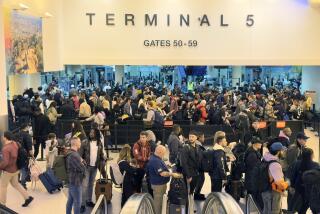Airlines Unlikely to Engage in Winter Fare War
- Share via
NEW YORK — U.S. airlines may cut fares this fall but will probably avoid the bitter fare wars of winters past because consolidation has taken many discounters out of the market, industry analysts say.
“I don’t think we’re going to see broad, across-the-board fare cuts,” said Helane Becker of Shearson Lehman Hutton.
Ten years ago, deregulation of the airline industry spawned a new generation of upstart, discount carriers. But most of those, like People Express, are gone.
And the fact that there are fewer airlines has led to higher prices, Becker said. Overall, average fares have risen about 10% in the first half of 1988.
Gone are the days of flying round-trip between New York and Los Angeles for $198. Coast-to-coast travel now costs $258 round trip, if restrictions like traveling between noon Monday and noon Thursday, booking a week in advance and making a stop are acceptable.
Winter Price Cuts
If not, be prepared to pay $298, $368 or more, depending on the day of travel and the service desired. Nonstops are often more costly than flights with one stop.
Airlines have been raising fares and streamlining pricing for more than 12 months. This past spring, for example, they eliminated a whole class of discount fares, aimed mostly at business travelers, and also raised their lowest fares.
The question, airline industry analysts said, is whether higher fares will endure through the coming winter. In the past, airlines have slashed prices to stimulate traffic during winter, traditionally a slow travel period.
In early 1987, for instance, Texas Air’s Continental Airlines unit created a new class of deeply discounted fares called Maxsaver. The airline sought to wrest market share from competitors but ran into a host of service problems.
Continental was absorbing People Express and other assets acquired by Houston-based Texas Air late in 1986. Later in 1987, Continental began raising fares along with other major carriers as traffic growth stayed fairly strong.
“A lot of the excessive competition we’ve seen the past few years seems to have quieted down,” said Harry Kimbriel, a Westport, Conn.-based aviation consultant. “In terms of broad fare cuts, there’s less likelihood of it this year than in years past.”
Economy a Factor
While Maxsaver fares are still available, they are generally higher than their introductory levels of early 1987. Such fares also carry tight restrictions, including requirements for advance and round-trip purchase as well as mandatory Saturday night stays.
“There are fewer airlines, they’re smarter and they have the revenue management systems,” said Anthony Hatch, an airline analyst with Argus Research. Airlines have also become more adept at limiting the availability of discount tickets, he said.
Widespread fare-cutting could return if the economy softens or if a carrier such as Continental decides to resume its fight for market share, airline analysts said.
But since deregulation, big airlines have carved out major hubs at various U.S. cities, where they dominate service and partly insulate themselves from competition.
Continental and Chicago-based UAL’s United Airlines, for example, are cutting back service and maintaining higher fares at Denver, where they both have hubs.
Two years ago the two were engaged in a bloody fare war to win customers. But higher fares, even with slightly fewer customers, have boosted profitability.
As fares have risen, so have most airline earnings and stocks, which have outperformed the broad market so far this year by a wide margin.
No Fare Wars
Many analysts expect airline stocks to come under pressure this fall as investors sell in anticipation of normal fall fare-cutting.
Others, like Hatch of Argus, believe that fare-cutting will be modest and that the stocks have room to move up. “There will be some normal post-Labor Day fare-cutting but we’re not in a fare war situation,” he said.
Julius Maldutis, an airline analyst with Salomon Bros., said fare-cutting this fall should be minimal, with airlines using incentives such as regional sales and relaxed restrictions to lure travelers.
“I do not anticipate we will see a massive breakdown” in fares, he said. “It’s a zero-sum game.”
Still, Maldutis is not convinced that airlines are changing their spots on discounting. “It’s premature to say that,” he said.
More to Read
Inside the business of entertainment
The Wide Shot brings you news, analysis and insights on everything from streaming wars to production — and what it all means for the future.
You may occasionally receive promotional content from the Los Angeles Times.










